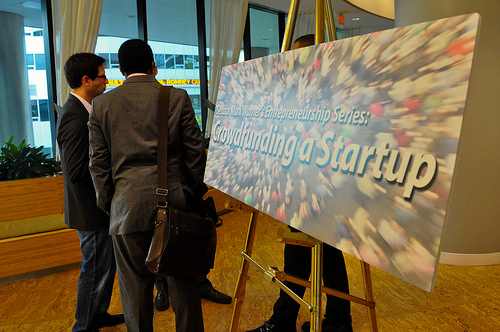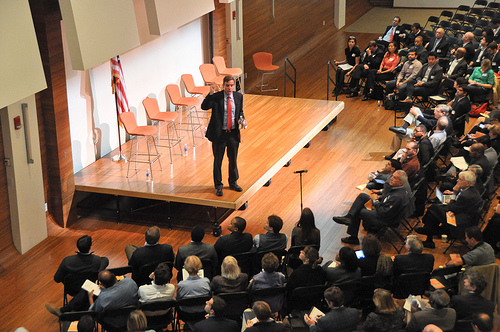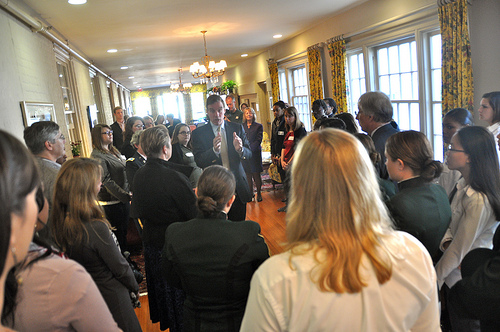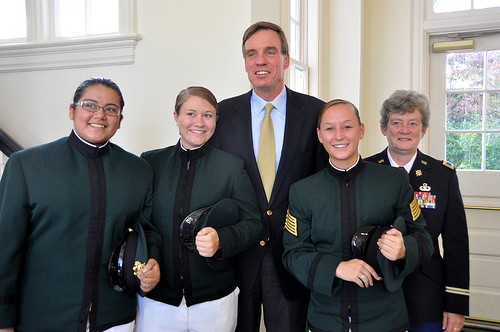Mark R. Warner
WSJ: CEOs Call for Deficit Action
By David Wessel
Oct 25, 2012 - 12:00 PM
Chief executives of more than 80 big-name U.S. corporations, from Aetna Inc. to Weyerhauser Co., are banding together to pressure Congress to reduce the federal deficit with tax-revenue increases as well as spending cuts.
The CEOs, in a statement to be released on Thursday, say any fiscal plan "that can succeed both financially and politically" has to limit the growth of health-care spending, make Social Security solvent and "include comprehensive and pro-growth tax reform, which broadens the base, lowers rates, raises revenues and reduces the deficit."
The declaration differs sharply from those of several other business groups, which urge Washington to deal with the deficit and avoid across-the-board spending cuts and tax increases set for year-end—but avoid any stance on the politically charged issue of raising taxes.
The CEOs who signed the manifesto deem tax increases inevitable no matter which party succeeds at the polls in November. "There is no possible way; you can do the arithmetic a million different ways" to avoid raising taxes, said Mark Bertolini, CEO of Aetna. "You can't tax your way to fix this problem, and you can't cut entitlements enough to fix this problem."
Mr. Bertolini emphasized that he and like-minded CEOs will resist raising taxes unless accompanied by significant spending restraint. "If someone were to make the argument, we just want to increase revenues so we can increase entitlements, the answer is no," he said.
Attempting to create a climate in which compromise is possible, the business executives are stepping into a debate over taxes that is one of the defining differences in the presidential campaign. President Barack Obama says tax increases on upper-income Americans, CEOs included, are an essential and fair element of any deficit-reduction program. Republican candidate Mitt Romney is against raising taxes, but backs a tax overhaul that he says would spur economic growth.
The executives didn't endorse Mr. Obama's proposal to raise the marginal income-tax rates for the top 2% of taxpayers or any other proposal. Rather, they called for an overhaul of the tax code that, among things, would eliminate or reduce deductions, credits and loopholes (known as "broadening the base"), and one that also would bring the Treasury more revenue than the existing code does.
The CEO statement was organized by the Fix the Debt campaign, a bipartisan effort largely inspired by Republican Alan Simpson and Democrat Erskine Bowles, who chaired a 2010 deficit panel appointed by President Obama and have been crisscrossing the country sounding fiscal alarms.
The executives called the Simpson-Bowles commission approach—about $3 in spending cuts for every $1 of tax increases—an "effective framework" for addressing what they termed "a serious threat to the economic well-being and security of the U.S."
Romney campaign spokeswoman Amanda Henneberg said, "As president, [Mr. Romney] will bring his record of bipartisan success to Washington and put us on a path to achieve more than the Simpson-Bowles commission ever proposed—balancing the budget within the next 10 years," said.
Obama campaign spokesman Ben LaBolt said, "There's a strong and growing consensus that the only way to reduce the deficit while also growing the economy is through a balanced approach that includes both tough spending cuts and increased revenue."
Some CEOs who have endorsed the group's statement, such as GE's Jeffrey Immelt, J.P. Morgan's James Dimon and Honeywell's Dave Cote, have been outspoken on public policy issues. Others, such as Deere & Co's Samuel Allen and Motorola Solutions' Gregory Brown, haven't been.
Many corporations rely on traditional Washington business lobbies, such as the Business Roundtable, U.S. Chamber of Commerce and National Association of Manufacturers, to speak for them on national policy issues, such as trade pacts or corporate taxes or high-skilled immigration. Fix the Debt is unusual in two respects: It circumvents those groups, which often find reaching consensus on contentious issues difficult, and is centered on the CEOs themselves, as opposed to their companies.
AT&T Inc. CEO Randall Stephenson said heads of capital-intensive companies, now making spending plans for next year, were easiest to enlist. They are particularly alarmed, he said, by the looming fiscal cliff, the spending cuts and tax increases set for Dec. 31 unless there is agreement on an alternative road to deficit reduction. "It is already having a direct and immediate effect on us," he said.
Mr. Stephenson, a Romney backer, regards tax increases as unavoidable. "When you talk about a $16 trillion debt, I don't see how you can avoid addressing both sides," namely spending cuts and tax increases. Asked about the difference between his position and Mr. Romney's, Mr. Stephenson said: "This is bigger than any one political candidate."
Notably absent from the Fix the Debt list are CEOs from big U.S. energy companies, some of whom fear that tax increases will fall more heavily on them, particularly if Mr. Obama is re-elected, and from Silicon Valley.
"We actually are planning events in Houston and Silicon Valley for that very reason," said Maya MacGuineas, director of the nonpartisan Committee for a Responsible Federal Budget, which spawned Fix the Debt. "It isn't that we have gotten 'no's' from these groups, we've just not met with them yet."
Hard-line foes of tax increases aren't likely to be moved by the CEOs.
"When bipartisan deals are struck promising to cut spending and raise taxes, the spending cuts don't materialize but the tax hikes do," Grover Norquist of the anti-tax Americans for Tax Reform, has said.
The CEOs aren't backing specific proposals for raising taxes or cutting spending, instead arguing that "everything should be on the table." Several see corporate tax reform as a way to shift the tax burden among companies rather than a way to raise revenue, which leaves increases in individual income taxes as the major option for raising money.
Fix the Debt has been building its roster of executives over several months, drawing in some CEOs who usually aren't visible in Washington. Deere's CEO, for instance, said he was invited to a dinner in Washington, D.C., by Eaton Corp.'s Sandy Cutler, an early recruit, and was told five senators would be there. "There were 14," Deere's Mr. Allen said, "and they talked about the need to work on a bipartisan basis and how they needed the business community to be involved and for CEOs, and I'll use their words, 'to provide cover.' "
Aetna's Mr. Bertolini traced his involvement to February 2011 when he called on Sen. Mark Warner (D., Va.) just as a meeting of the Gang of Six, a bipartisan group of senators pursuing a deficit compromise, was breaking up. "Sen. Warner put his head in his hands, and said, 'Why is this so hard?' " Mr. Bertolini offered some lessons from his career, and asked what he could do to help. "Warner said, 'Well, you can get the damn business community to line up,' and went off on a 20-minute tirade about the business community sitting on their hands," Mr. Bertolini recalled.
Scars from the market-churning August 2011 showdown on Capitol Hill over raising the federal debt ceiling also prompted some executives to speak up now.
"The business community was stunned that Washington let it go that far," said Motorola Solutions' Mr. Brown. "Part of the reason for uniting behind this effort is that we wanted to highlight that we don't want a repeat of those political theatrics."
Neither Mr. Brown nor Mr. Allen has publicly endorsed a presidential candidate. Mr. Brown has contributed to Republican congressional campaigns. Mr. Allen contributed to Mr. Romney's campaign in 2011 and has contributed to several Republican congressional candidates, according to the Center for Responsive Politics.Fix the Debt is led by former Gov. Edward Rendell and former Sen. Judd Gregg.
Aetna's Mr. Bertolini wouldn't say how he plans to vote on Nov. 6. He has contributed to re-election campaigns of a handful of senators from both parties, but not to either presidential candidate, according to the Center for Responsive Politics.
Most of the companies whose CEOs have enlisted in Fix the Debt have political-action committees that make substantial campaign contributions, usually to candidates of both parties and mostly seen as advancing their corporate interests rather than the broader national interest. Concerns about the risk that mounting debt poses to the nation, the CEOs said, prompted their companies to contribute to Fix the Debt. The campaign has raised about $35 million for staff and, possibly, paid advertising after the election.
"The Biggest Risk our Country Faces"
Oct 25, 2012 - 11:30 AM
CEOs of more than 80 big American corporations voiced support today for a comprehensive, bipartisan deficit reduction plan in a joint statement organized by the bipartisan Fix the Debt campaign. The statement calls on Congress to pass a deficit reduction package that includes tax reform that raises new revenue, entitlement reforms and spending cuts.

“There is no possible way; you can do the arithmetic a million different ways" to avoid raising taxes, Mark Bertolini, CEO of Aetna, told the Wall Street Journal’s David Wessel. "You can't tax your way to fix this problem, and you can't cut entitlements enough to fix this problem."
Aetna's Mr. Bertolini traced his involvement to February 2011 when he called on Sen. Mark Warner (D., Va.) just as a meeting of the Gang of Six, a bipartisan group of senators pursuing a deficit compromise, was breaking up. "Sen. Warner put his head in his hands, and said, 'Why is this so hard?'"
Several of the CEOs involved in the Fix the Debt campaign rang the bell to open the New York Stock Exchange this morning in an effort to bring attention to the issue of the deficit.
“We're in the business of risk management, and this is the biggest risk our country faces,” said Dan Glasier, COO/President of Marsh & McLennan.
Panetta: Hampton Roads 'critical' to national defense
Oct 22, 2012 - 11:00 AM
Secretary of Defense Leon Panetta says the Hampton Roads region is a great example of the committed community partnerships that keep the American military the strongest in the world. The Pentagon chief traveled to Norfolk at Senator Warner’s request on Friday to speak to members of the Hampton Roads Chamber of Commerce.

“As Secretary of Defense, I want to do everything I can to keep this community strong in terms of its military future,” Secretary Panetta said. “Simply put, this region houses perhaps the greatest concentration of military might in the world. And the support offered by this community to its service members, its veterans, to their families, is an incredibly important part of what makes this area the strategic national asset that it is. Your dedication, your commitment, your service, your patriotism, is critical to the military and, very frankly, critical to our national security,” Panetta said.
Secretary Panetta joined Senator Warner in expressing cautious optimism that a divided Congress will act responsibly to prevent automatic Pentagon budget cuts from taking effect in January. The automatic cuts were never intended to happen but Congress added them to legislation as a threat to force action.
"They [Congress] put a gun to their head and said, 'If we don't do what's right, we'll blow our heads off.' And they didn't do what's right, and now the damn gun is cocked - to go off in January," he said.
As The Virginian Pilot’s Bill Bartel reported, Secretary Panetta also pledged that the region's shipyards and other defense contractors need to be preserved even as the Pentagon adjusts to reduced defense funding following a decade of war.
"We will continue to invest in the unique capabilities and military and industrial facilities like those in Hampton Roads," Panetta said. "The facilities help us protect the strongest military in the world."
You can read the full text of the Secretary’s remarks here.
Senator Warner told the business and military leaders that the national debt crisis is the fault of both major political parties in Washington, and it will require compromises on cuts and new revenue to get it under control.
"Anyone who thinks we can get there with simply a nip and tuck here, a cut here or there, either with defense or discretionary spending alone, cannot read a balance sheet," Senator Warner said. "Anyone that is running for office and takes a pledge that says ‘we will never look at revenue’ or ‘we will never look at entitlement spending’ is not a serious person about dealing with our debt crisis."
Secretary Panetta saluted Senator Warner’s leadership role in seeking common ground on the deficit and debt issue.
“Whatever I do in my job, whatever we do on national debt, if we don't have elected leaders who are willing to come together and solve the problems facing this country, our national security is in jeopardy,” Secretary Panetta said. “I really do commend [Mark] for his leadership -- his bipartisan leadership, which is so important, as Governor and now as United States Senator. He's in a critical role where he could play a very important part of trying to bring together the kind of consensus that's absolutely essential if we are going to be able to resolve this issue,” the Secretary said.
Crowdfunding a Startup
Oct 17, 2012 - 04:00 PM
“Crowdfunding has the potential to not only change the way that startup businesses access capital, but to allow entrepreneurs to create and keep jobs in places like Danville or Roanoke,” Senator Warner said today in Arlington at the first of a series of events that he’s holding to help Virginia entrepreneurs better understand how crowdfunding can be a tool for business growth.
Today’s event included a brief introduction by Senator Warner, followed by a panel discussion with a diverse range of regional experts and business leaders, including the CEOs of Indiegogo, NewsiT, Smallknot, and TapCaps.
“Virtually all of the net new jobs that were created in America over the last 30 years have been created by startups,” Senator Warner said.
Crowdfunding is a way for businesses to raise capital through the pooling of many relatively small investments. Though not a new concept, advances in internet technology have paved the way for crowdfunding to “really change the world,” said Senator Warner. Using new platforms such as Indiegogo and Smallknot geared towards connecting businesses with potential small investors, some entrepreneurs have raised millions of dollars needed to get their businesses started.
A recent report cited by the Milken Institute estimates that $2.8 billion would be raised via crowdfunding in 2012 alone, an 87% increase over 2011. Panelists also explained how these initial investments gathered through crowdfunding can help attract capital from more traditional sources.
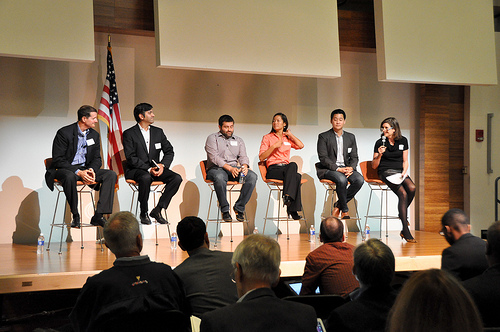
Though potentially a great tool for entrepreneurs in need of capital, Senator Warner and most of the panelists agreed that the potential pitfalls of crowdfunding – including investor protections, managing investor expectations, and even liability questions – must be carefully weighed in order to protect those small investors and contributors.
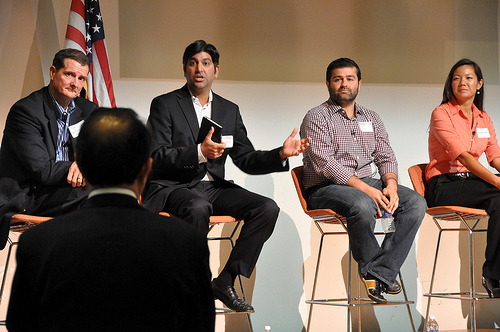
Resources from today's seminar will be available here. Senator Warner will be holding at least 4 more crowdfunding-related events across the Commonwealth between now and the end of the year. The next will take place in Norfolk on Thursday, October 25, and will be followed by a networking happy hour. For more information, please visit Senator Warner’s crowdfunding page.
Waynesboro News Virginian: Warner talks deficit and careers at Mary Baldwin
By Bob Stuart
Oct 13, 2012 - 12:30 PM
STAUNTON, Va. -- Virginia U.S. Sen. Mark Warner offered Mary Baldwin College students an update on federal deficit reduction efforts and encouragement about their futures during a Friday visit.
Warner met with students after Mary Baldwin President Pamela Fox briefed him on the latest developments at the college.
A budget deficit reduction plan being considered would involve entitlement reform, cuts in spending and raising revenue, according to Warner.
During an interview after his talk, Warner said the changes could entail
“If we don’t fix it, guess who is going to fix it?” he asked, pointing to the students.
The magic deficit reduction number being discussed with the bipartisan Gang of Eight Warner is a member of is $4 trillion.
He said the deficit reduction plan being considered would address the issue of sequestration. If sequestration happened, estimates are it could cost Virginia about 200,00 defense-related jobs.
But Warner was not coy is saying that the federal debt is more than just a drag on the U.S. economy.
“Admiral Mullen has said that the biggest threat to our military is our debt,” he said referring to Admiral Mike Mullen, the retired chairman of the Joint Chiefs of Staff.
While not pointing fingers at the administration of former President George W. Bush, Warner said the Bush era tax cuts amounted to $4.5 trillion over a 10-year period.
He said defense spending was doubled, the Iraq and Afghanistan wars were put on a credit card and he also spoke of the expense of the Medicare Part D prescription plan for seniors.
Many of the students in attendance Friday are preparing to vote in next month’s presidential election for the first time. Warner urged the students to stay politically active and informed.
The senator said neither the Republican Party nor the Democratic Party “has a monopoly on truth or patriotism."
He said it is important for the students to listen to diverse views.
When asked about jobs prospects for graduates, Warner told the students: “don’t be afraid to fail."
Warner failed at the first two business ventures he ever attempted before becoming rich as one of the founders of Nextel, the telecommunications company.
He told the students they should start a business now.
"If you have a desire to start a business, do it when you are young,” Warner said.
Having a business partner is important. Warner said Bill Gates, Mark Zuckerberg and other billionaires all partnered with someone.
As for
Education is the key to America’s economic future.
He said America’s "investment in intellectual capital” along with a free enterprise system and the rule of law all figure prominently in the country’s future economic health.
Mary Baldwin’s Fox told Warner about the college’s record
"He knows a lot about Mary Baldwin,” said Fox, who also said Warner offered to do what he could to help the college.
Mary Baldwin College senior Aisha Ford appreciated Warner’s visit, but yearned to have additional detail on the deficit reduction. "I was hungry for more information,” she said.
Staunton News Leader: Warner tells MBC students he's working to reduce their government 'bill'
By Calvin Trice
Oct 13, 2012 - 12:00 PM
STAUNTON — Federal lawmakers need to keep their commitment to education without loading too much debt onto the young people whose education it funds, U.S. Senator Mark Warner, D-Va., told Mary Baldwin College students Friday.
The former governor was on campus to get an update on school projects before addressing a group of Mary Baldwin students and answering questions.
Warner asked how many of the 40-or-so students inside the college administration building received federal Pell Grants to help pay for their schooling. Most raised their hands.
The challenge for bringing the federal budget closer into balance is to make the decisions needed without sacrificing important programs like higher education grants.
“If we’re gonna get this fixed, we’ve gotta make sure we maintain Pell Grants,” Warner said. “We’ve got to make sure sure we continue to invest in research and development; we’ve gotta make sure we’re gonna continue to build roads.”
Nevertheless, bringing down annual budget deficits and paying down the national debt that’s built up over the years from all that borrowing will be one of Congress’ highest priorities the next term, Warner said.
He met privately with Mary Baldwin President Pamela Fox to learn the progress for plans on the health sciences center the school will build in Fishersville near Augusta Health.
Warner addressed the students afterward outside Fox’s office.
He’s been meeting with a group of Republican and Democratic senators this week on a deal to trim $4 trillion in federal spending and avoid automatic spending cuts and tax hikes set to take place at the end of the year if there’s no new budget agreement, Warner told students.
The latest edition of the senatorial budget negotiating “gang,” which now numbers eight, is outlining a deal that could get tax-and-spending talks going regardless of who wins, he said.
“How do you cut some of the spending? How do you raise some more money,” Warner said. “How do we try to get ourselves back in a way so that we don’t turn over the keys to you guys in a country that’s not in good fiscal shape, or turn over the keys with you having a big bill.”
Both parties are to blame for running up the debt, and bringing it down will require a compromise balance of cuts and new tax revenues, he said.
The current political environment makes coming up with a deal before Election Day just about impossible, he said at a press briefing later.
A number of students who listened were part of the Virginia Women’s Institute for Leadership, Mary Baldwin’s military-style education program. When one of them asked about helping sailors and soldiers who might lose their jobs due to cuts in military spending, the senator told her the veterans’ unemployment rate is “embarrassing.”
One measure Congress is considering would make technical training in the military the certified equivalent for civilian jobs, Warner said.
“One of the things we’re trying to work on now is making sure that if you’re learning a skill in the military, and you get certified in the military, you get certified for civilian use as well,” he said.
When a student asked for advice entering the work world, he encouraged them to take risks.
He recalled that nearly all in the group had raised their hands when he asked how many relied on student loans. “Candidly, you’re already in debt,” he said. The best time to try running a businesses is when they’re young, he told them.
Christina Leyton, an MBC senior and VWIL cadet, appreciated Warner’s centrist political and civic emphasis.
“I am kind of in the middle right now,” Leyton said of her position for the upcoming elections. “Just hearing that he’s kind of like the same way – you can’t always pick one side, or pick another. Just listen to both sides and be open. That was really great.”
At the press conference, Warner wouldn’t reveal specifics of the deal the “Gang of Eight” is hammering out, but said that the framework is the same as the one used for previous Congressional proposals.
“Everybody kind of knows what the menu looks like. We just have to go ahead a make some choices,” he said.
And lawmakers shouldn’t just delay a decision to ward of the scheduled, automatic budget sequestrations that economists believe would put the national economy back into recession.
The markets wouldn’t react well to such a delay, Warner said.
The fortunes of former Gov. Timothy Kaine (D) in his U.S. Senate bid against Republican former Gov. George Allen will hinge on the polling for President Barack Obama’s re-election bid, said Warner, who has campaigned for Kaine.
Next week’s presidential debate will play an important role, he added.
On the Road: Staunton
Oct 12, 2012 - 04:30 PM
Senator Warner kicked off a day of travel through central and southwest Virginia with a stop this morning at Mary Baldwin College in Staunton to chat with students and administrators.
Senator Warner started by talking about the importance of preserving student loans.
"How many of you are on Pell grants?" Senator Warner asked the students. About 15 of 30 students raised their hands. "How many of you have student loans?" Almost all of the students raised their hands.
"Student loans were incredibly important to me," the Senator said. "I was the first person in my family to graduate from college and without loans, I wouldn't have been able to afford it."
Senator Warner also discussed his work on deficit reduction. Mary Baldwin is home to the Virginia Women’s Institute for Leadership, the world’s only all-female cadet corps, so students were understandably worried about the effect of mandatory defense cuts.
"We can't have the sequester cuts, especially in a state like ours, but there's going to have to be cutbacks," Senator Warner said. " And if we just kick the can down the road, none of this gets any easier. Every day we fail to act, we add $4 billion to our national debt.
Sen. Warner to host 3rd annual Va. Women's Conference
Contact: Beth Adelson - (202) 228-6884
Oct 10, 2012 - 11:00 AM
WASHINGTON – U.S. Senator Mark R. Warner will host the third annual Virginia Women’s Conference on Saturday, Oct. 13, 2012 in Roanoke. The Conference will help to connect women from across Virginia with personal and professional growth and networking opportunities. This year’s summit will feature remarks by Sen. Warner, Marie C. Wilson, founder of the White House Project and author of Closing the Leadership Gap: Why Women Can and Must Help Run the World, and Toni Blackman, a noted artist and U.S. State Department Cultural Ambassador.
“The 2012 Virginia Women’s Conference celebrates the success and leadership of women from the Commonwealth,” Sen. Warner said. “A variety of speakers and workshops will help to build on this success by providing resources that will help attendees further develop their skills in leadership and workplace innovation.”
Saturday’s program begins at 9:00 AM at The Hotel Roanoke & Conference Center, located at 110 Shenandoah Avenue, Roanoke. More information, including a detailed schedule, is available here. The event is free, but registration is required. Co-hosts include the Virginia Tech Roanoke Center, Hollins University, the City of Roanoke, and the Roanoke Valley Convention & Visitors Bureau.
Last year’s conference attracted more than 750 women from across the Commonwealth to Old Dominion University in Norfolk.
Chesapeake Bay Senators urge USDA to support farmers during lapse of Farm Bill authorization
Contact: Kevin Hall - (202) 228-6884
Oct 3, 2012 - 11:30 AM
WASHINGTON – Chesapeake Bay Watershed Senators Mark R. Warner (D-VA), Ben Cardin (D-MD), Barbara A. Mikulski (D-MD), Tom Carper (D-DE), Chris Coons (D-DE), Bob Casey (D-PA), Charles Schumer (D-NY) and Kirsten Gillibrand (D-NY), wrote to U.S. Secretary of Agriculture Tom Vilsack and National Resources Conservation Service (NRCS) Chief Dave White urging them to support Chesapeake Bay watershed farmers during the interim period since the lapse of the Farm Bill authorization. Because the House of Representatives allowed the Farm Bill authorization to expire without even passing a short-term extension, the Chesapeake Bay Watershed Initiative’s (CBWI) authorization also expired preventing the NRCS from entering into new CBWI contracts. In August, the Chesapeake Bay watershed senators wrote to the House Leadership urging them to pass the Senate version of the Farm Bill, including new funding to support the health of the Bay.
“The Chesapeake Bay Watershed Initiative has provided farmers in our states with essential resources they need to meet the conservation challenges of farming in the Chesapeake Bay watershed. Our farmers have come to rely on this important program, so much so, the sudden expiration of the CBWI may not only come as a surprise, but also may dramatically impact many of our farmers’ bottom line,” the Senators wrote in their letter to Secretary Vilsack and Chief White. “We ask that field staff be prepared to help the Chesapeake Bay region’s agricultural communities navigate the consequences of this expiration.”
In June, the U.S. Senate overcame its partisan differences to pass a new Farm Bill. The Agricultural Reform, Food and Jobs Act provides more effective agricultural support programs for family farmers while reducing the budget deficit by more than $23 billion over the next five years. It preserved funding for conservation efforts of farmers in the Chesapeake Bay watershed by consolidating the Chesapeake Bay Watershed Initiative Program with a few other similar programs into a new Regional Conservation Partnership Program (RCPP). The structure of the RCPP emphasizes cooperation between producers and regional stakeholders to work together to improve the effectiveness of agricultural conservation activities by leveraging non-government funds in support of conservation projects.
Identified as a National Treasure by President Obama and his predecessors, the Chesapeake Bay is the largest estuary in North America, with a length of 200 miles and 11,684 miles of tidal shoreline, more than the entire U.S. West Coast. About 100,000 streams and rivers thread through the Chesapeake’s 64,000-square-mile watershed, which is home to almost 17 million people across Maryland, Virginia, Pennsylvania, Delaware, New York, West Virginia and the District of Columbia. Twenty-five percent of lands within the watershed are used for agricultural purposes. The economic value of the Bay is estimated to be more than $1 trillion, but that value is dependent on the health of the Bay’s waters and fisheries.
Sen. Warner Announces $4.9M for Veterans Cemeteries in Virginia
Contact: Beth Adelson - (202) 228-6884
Oct 2, 2012 - 03:30 PM
WASHINGTON – The U.S. Department of Veterans Affairs has awarded nearly $5 million for operations at state veterans cemeteries in Amelia County and the city of Suffolk, U.S. Sen. Mark R. Warner announced today. The V-A awarded $3.3 million to the Albert G. Horton Jr. Memorial Veterans Cemetery in Suffolk and $1.6 million to the Virginia Veterans Cemetery in Amelia. The grants come from the federal Veterans Cemetery Grants Program, which funds state efforts to establish, expand, operate and improve veterans cemeteries. The funds will support roadway expansions, irrigation improvements and new signage at the Virginia cemeteries.
“Virginia has a long history of supporting our veterans and military families, and these grants support our efforts to continue to honor our military men and women,” Sen. Warner said. “We owe this obligation to those who have served, and I am pleased to announce this ongoing federal support for Virginia’s efforts.”
As Governor, Sen. Warner participated in the 2003 groundbreaking and 2004 dedication of the Suffolk veterans cemetery. In addition, then-Governor Warner partnered with leading veterans organizations to streamline and improve state veterans services, including appointment of a Cabinet-level official responsible for Virginia’s delivery of services to veterans. As a member of the U.S. Senate, Warner’s efforts resulted in expanded V-A health services for women veterans returning from Iraq and Afghanistan. In addition, Sen. Warner spearheaded a partnership between the U.S. Army and Northern Virginia’s leading technology firms in a pro bono effort to help fix chronic mismanagement and I-T challenges at Arlington National Cemetery.
“V-A is committed to helping state and tribal veterans cemeteries meet national shrine standards and honor veterans with dignified burials,” said U.S. Secretary of Veterans Affairs Eric K. Shinseki. “It is vitally important that state and tribal governments have the resources necessary to offer quality services to our nation’s veterans and their families.”
LATEST NEWS
- "The Biggest Risk our Country Faces"
- Panetta: Hampton Roads 'critical' to national defense
- Crowdfunding a Startup
- On the Road: Staunton
NEWS CLIPS
- WSJ: CEOs Call for Deficit Action
- Waynesboro News Virginian: Warner talks deficit and careers at Mary Baldwin
- Staunton News Leader: Warner tells MBC students he's working to reduce their government 'bill'
- Roanoke Times: Warner touts $815K grant for music, arts & recreation-based tourism in Southwest Virginia
